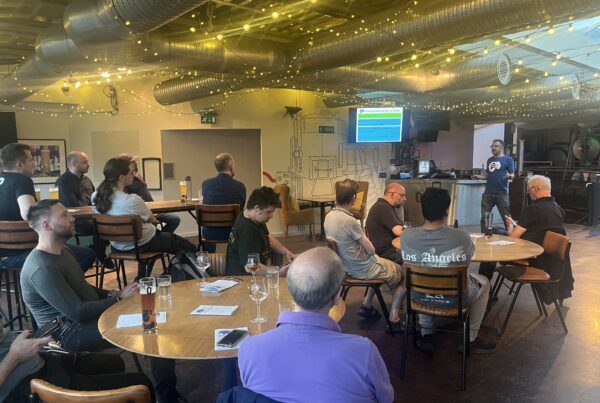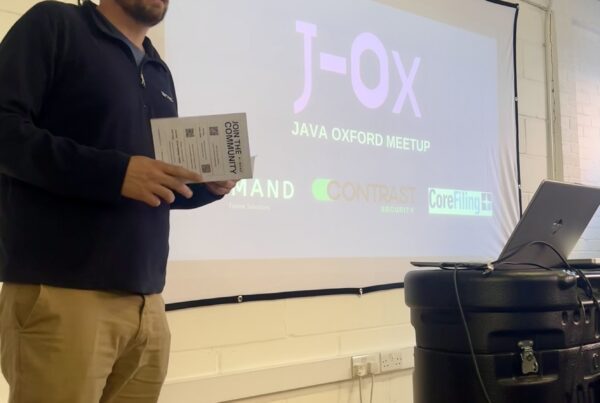October 2024, Oxfordshire’s DevOps professionals gathered for the latest DevOps Oxford event, a high-energy evening of networking, learning, and in-depth discussions on trends shaping today’s DevOps landscape. With a full agenda featuring two engaging presentations, attendees explored innovative approaches to optimising workflows and managing complex infrastructure—topics that are increasingly crucial in today’s tech-driven business world.
Here, we’ll walk through the highlights of the event’s two standout talks and share insights that could transform your own DevOps strategies. Let’s dive in!
Talk #1: Minimalism in DevOps – by Rajkumar Sakthivel
Rajkumar Sakthivel kicked things off with his presentation, “Minimalism in DevOps”, a concept that often goes overlooked in the pursuit of more tools and processes. Rajkumar argued that DevOps teams can enhance efficiency and reduce risk by focusing on simplicity, advocating for a “less is more” approach to technology.
What Does Minimalism Mean for DevOps?
Minimalism in DevOps means refining processes, tools, and workflows to eliminate unnecessary complexities, allowing teams to work with greater focus and efficiency. As DevOps traditionally revolves around continuous integration, continuous delivery (CI/CD), and collaboration, adding too many tools or steps can bog down productivity. Minimalism helps address this by encouraging teams to streamline their approach, focusing only on what truly adds value.
Key Principles of Minimalism in DevOps:
- Simplify Toolchains: Stick to core CI/CD tools like Jenkins or GitLab CI, cutting down on redundant or overly complex options.
- Streamline Infrastructure Management: Leverage Infrastructure as Code (IaC) tools, such as Terraform or AWS CloudFormation, to manage cloud environments cleanly.
- Automate Wisely: Use cloud-based automation tools like AWS Lambda or Google Kubernetes Engine (GKE) for repetitive tasks, freeing up resources for high-value work.
Why Adopt Minimalism in DevOps?
Rajkumar pointed out several benefits that a minimalist approach offers:
- Enhanced Efficiency: With streamlined workflows, teams can release updates faster and more consistently.
- Increased Reliability: Reducing complexity lowers the risk of errors, leading to more stable systems.
- Lowered Cognitive Load: Fewer tools and processes mean teams can focus on strategic priorities rather than battling technical overload.
Practical Steps to Implement Minimalism
Transitioning to a minimalist approach in DevOps can be challenging, especially in organisations where complex, legacy systems are in place. Rajkumar shared some actionable tips:
- Evaluate Tool Usage Regularly: Audit your toolchain frequently, consolidating where possible to reduce redundancies.
- Smart Automation: Avoid over-automating by focusing on the tasks that truly benefit from automation without creating dependencies that increase complexity.
- Promote a Simplicity-First Culture: Cultivate a mindset of continuous simplification by encouraging your team to seek the simplest solution that meets project needs.
Talk #2: Observability as Code in the MACH World – by Elliott Winskill
Elliott Winskill’s talk, “Observability as Code in the MACH World”, dove into the power of observability when paired with MACH (Microservices, API-first, Cloud-native, and Headless) architecture. As a specialist at PMC—a digital transformation leader in Retail and B2C—Elliott brought insights into how observability enhances performance monitoring in agile, scalable environments.
An Introduction to MACH Architecture
MACH architecture (Microservices, API-first, Cloud-native, Headless) is all about breaking down applications into smaller, manageable microservices, connecting through APIs, and maximising flexibility with cloud-native and headless front-end structures. The result is a platform architecture that is future-proof, scalable, and adaptable to new business requirements—essential in today’s fast-evolving markets.
Observability as Code: Building Observability into the Codebase
Observability as Code embeds observability directly within the application code, enabling continuous monitoring of system health and performance. This approach ensures that as new features are released, performance data is consistently monitored, and issues are quickly identified and addressed.
Why Observability Matters for Retail & B2C
In Retail and B2C, where user experience is paramount, observability helps to ensure seamless performance across digital platforms. Elliott shared how PMC’s use of MACH architecture, combined with Observability as Code, has delivered the following advantages:
- Improved Reliability: By incorporating observability within the codebase, PMC can monitor real-time performance on its Graphene platform, identifying issues early for prompt resolutions.
- Scalability: The modular nature of MACH architecture allows PMC to scale its platforms as needed without sacrificing performance.
- Accelerated Innovation: Built-in observability allows for rapid feature deployment, with confidence that potential issues will be detected and addressed immediately.
How to Get Involved
As the event wrapped up, attendees left buzzing with new ideas and practical strategies for enhancing DevOps workflows and managing performance in modern platforms. If you’re passionate about DevOps and want to share your insights, we’d love for you to join us as a speaker at a future event!
Get in touch with Rebecca at rebecca@humand.co.uk to discuss speaking opportunities. It’s an exciting chance to contribute to Oxfordshire’s DevOps community and to help shape discussions around best practices in DevOps, minimalism, and observability.
Stay Connected with DevOps Oxford
For those who couldn’t attend, or if you’re keen to join future discussions, join the DevOps Oxford group on Meetup! It’s a great way to connect with like-minded professionals, stay updated on upcoming events, and be part of Oxford’s thriving DevOps community.
About Humand – Your Talent Solution Partner
At Humand Talent, we specialise in supporting tech businesses with customised recruitment solutions, from contract to permanent placements. Whether you need skilled software engineers, DevOps experts, or specialised talent in Oxford and beyond, we’re here to help you build your team with ease and precision. Learn more about our services on the Humand Talent homepage.
Don’t forget to follow #DevOps #DevOpsOxford #HumandTalent #RecruitmentSolutions #SoftwareEngineering #MinimalismInDevOps and stay updated on future events. And if you’re interested in sponsoring or speaking at our events, reach out to discuss how you can contribute to this inspiring community!




